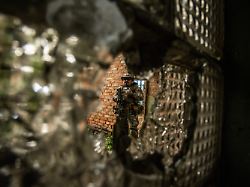“First Breakthroughs in the South”
Military analyst sees successes in Kiev’s offensive
08/25/2023, 04:20 am
After doubts from Washington about the effectiveness of the Ukrainian counter-offensive, a German military expert comes to completely different conclusions. Mölling attests to Kiev’s important breakthroughs on the southern front and clever attrition tactics in the east. The war will still last a long time.
Unlike representatives of the US Army, military expert Christian Mölling from the German Council on Foreign Relations (DGAP) has confirmed Ukraine’s progress in its counteroffensive. “There are first breakthroughs on the southern front line. Whether they can be widened also depends on what the Ukrainians find in the second line of defense,” Mölling told the Funke newspapers. “One hypothesis is that the Russians don’t have enough manpower at this stage to heavily man the other lines of defense.”
According to Mölling, the Ukrainians have “destroyed a great deal of Russian military infrastructure and logistics in recent months.” “The question is: in view of the military challenges, does gaining land or destroying the enemy’s logistics count? One thing is clear: the ultimate goal is measured by territorial success.”
US maneuver criticism inaccurate
Mölling rejected criticism from the USA that the Ukrainians were not concentrating enough on the southern front. “I assume that the Ukrainians know best how to fight this war. They are quite successful in the east. They are succeeding in destroying Russian infantry on a large scale at the front near Bakhmut,” emphasized the military expert. “The Russians don’t want to give up Bakhmut. So they have to keep sending in new forces and lose a lot of soldiers in the process.”
Mölling emphasized that the war would last a long time. “The most likely scenario is that at some point both sides, out of exhaustion, enter a phase of conflict in which fighting continues but no major operations can be accomplished.” This would be comparable to the skirmishes along the contact line in Donbass in the years after 2014.
The death of the head of Wagner’s private army, Yevgeny Prigozhin, was a sign from Kremlin chief Vladimir Putin to others who “are thinking about a putsch,” explained Mölling. “But Putin is trying to stabilize his power apparatus – a central internal requirement for Russia to be able to continue its war of aggression at all.”
